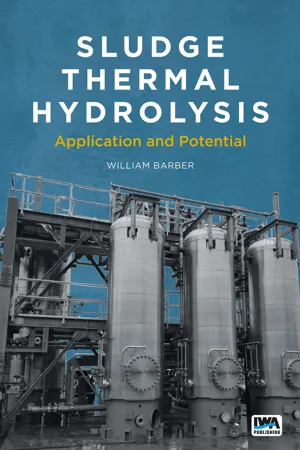
- 160 pages
- English
- ePUB (mobile friendly)
- Available on iOS & Android
eBook - ePub
About this book
Thermal hydrolysis is revolutionizing wastewater treatment. Current treatment methods have evolved little since pioneering work in the late 19th and early 20th centuries. Subsequently, most wastewater treatment plants are not designed to meet modern drivers such as energy conservation and nutrient recovery. Additionally, sludge management is expensive and often not viewed in high regard by external stakeholders.
By changing the properties of sewage sludge, thermal hydrolysis allows wastewater treatment works to become more efficient, enabling the treatment of greater flowrates to higher standards. Production of renewable energy from sludge is increased, whilst quantity of treated material reduced, which further decreases processing requirements and costs regardless of what they may be. This book, aimed at students and practitioners alike, describes the development of the technology, and highlights the design and economics by means of examples. Benefits and challenges related to thermal hydrolysis are also characterized alongside selected case-studies and ideas for future applications.
Dr William (Bill) Barber has had a keen interest in thermal hydrolysis for numerous years and was instrumental in the development of Europe's largest facility as well as advising water utilities, consultants, researchers and government organizations on its potential to modernize wastewater treatment.
Trusted by 375,005 students
Access to over 1 million titles for a fair monthly price.
Study more efficiently using our study tools.
Information
Table of contents
- Cover
- Half Title
- Title Page
- Copyright Page
- Contents
- About the Author
- Preface
- Acknowledgements
- Chapter 1: Introduction
- Chapter 2: Design – Mass and energy balance
- Chapter 3: Impacts of thermal hydrolysis
- Chapter 4: Operational experience
- Chapter 5: Benefits
- Chapter 6: Case studies
- Chapter 7: Economics
- Chapter 8: Future developments
- Index
Frequently asked questions
Yes, you can cancel anytime from the Subscription tab in your account settings on the Perlego website. Your subscription will stay active until the end of your current billing period. Learn how to cancel your subscription
No, books cannot be downloaded as external files, such as PDFs, for use outside of Perlego. However, you can download books within the Perlego app for offline reading on mobile or tablet. Learn how to download books offline
Perlego offers two plans: Essential and Complete
- Essential is ideal for learners and professionals who enjoy exploring a wide range of subjects. Access the Essential Library with 800,000+ trusted titles and best-sellers across business, personal growth, and the humanities. Includes unlimited reading time and Standard Read Aloud voice.
- Complete: Perfect for advanced learners and researchers needing full, unrestricted access. Unlock 1.4M+ books across hundreds of subjects, including academic and specialized titles. The Complete Plan also includes advanced features like Premium Read Aloud and Research Assistant.
We are an online textbook subscription service, where you can get access to an entire online library for less than the price of a single book per month. With over 1 million books across 990+ topics, we’ve got you covered! Learn about our mission
Look out for the read-aloud symbol on your next book to see if you can listen to it. The read-aloud tool reads text aloud for you, highlighting the text as it is being read. You can pause it, speed it up and slow it down. Learn more about Read Aloud
Yes! You can use the Perlego app on both iOS and Android devices to read anytime, anywhere — even offline. Perfect for commutes or when you’re on the go.
Please note we cannot support devices running on iOS 13 and Android 7 or earlier. Learn more about using the app
Please note we cannot support devices running on iOS 13 and Android 7 or earlier. Learn more about using the app
Yes, you can access Sludge Thermal Hydrolysis by William Barber in PDF and/or ePUB format, as well as other popular books in Biological Sciences & Applied Sciences. We have over one million books available in our catalogue for you to explore.